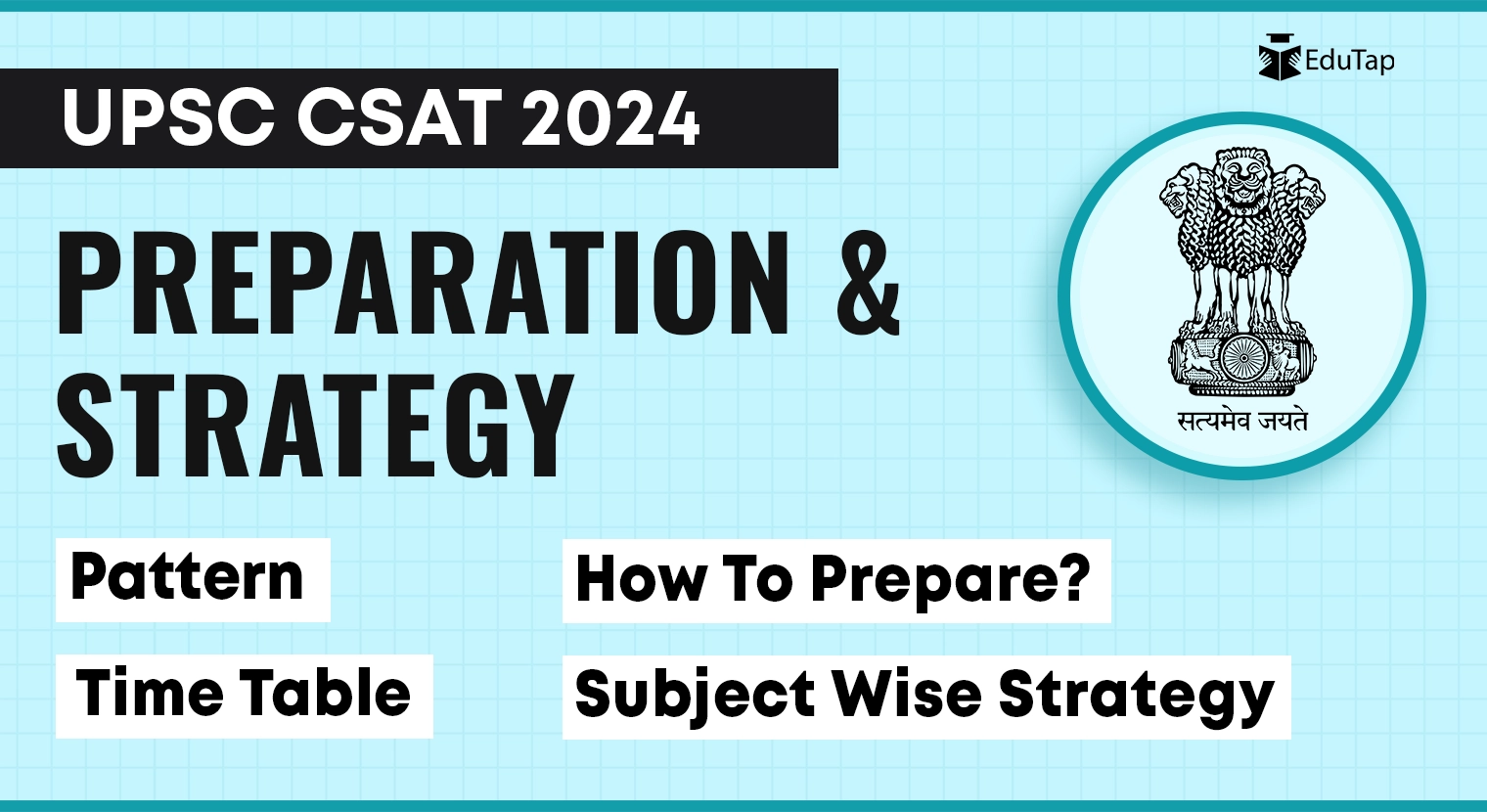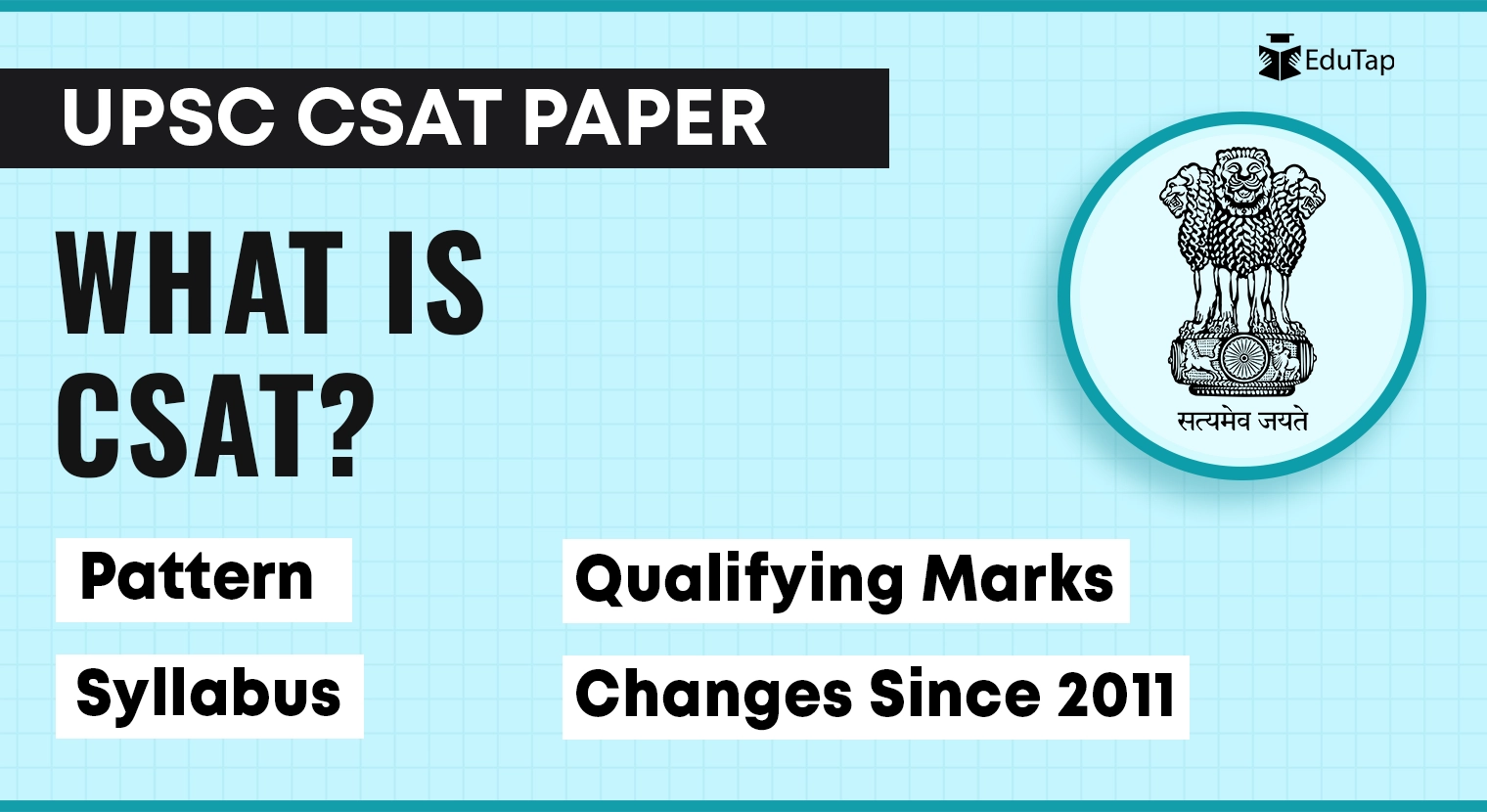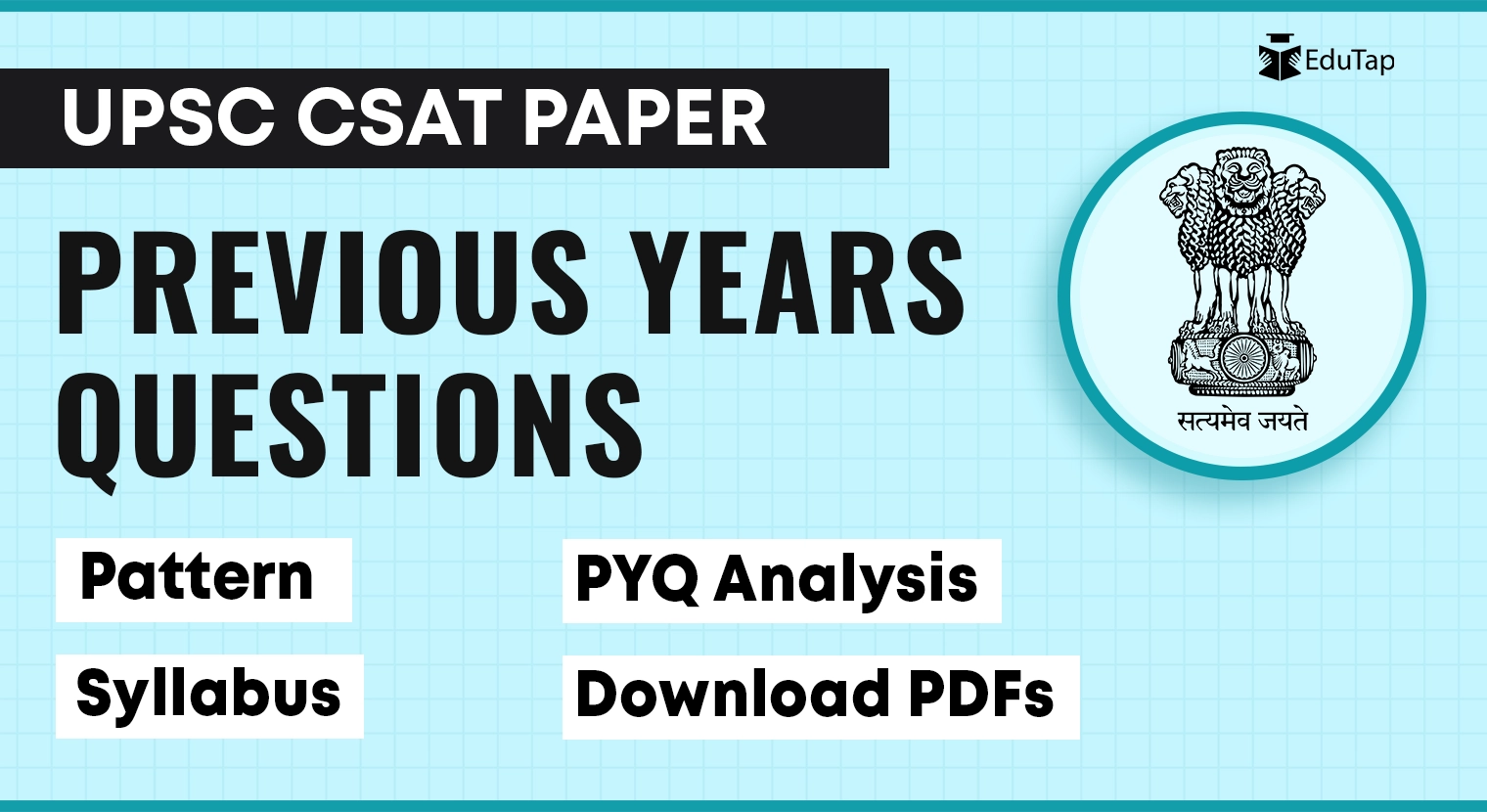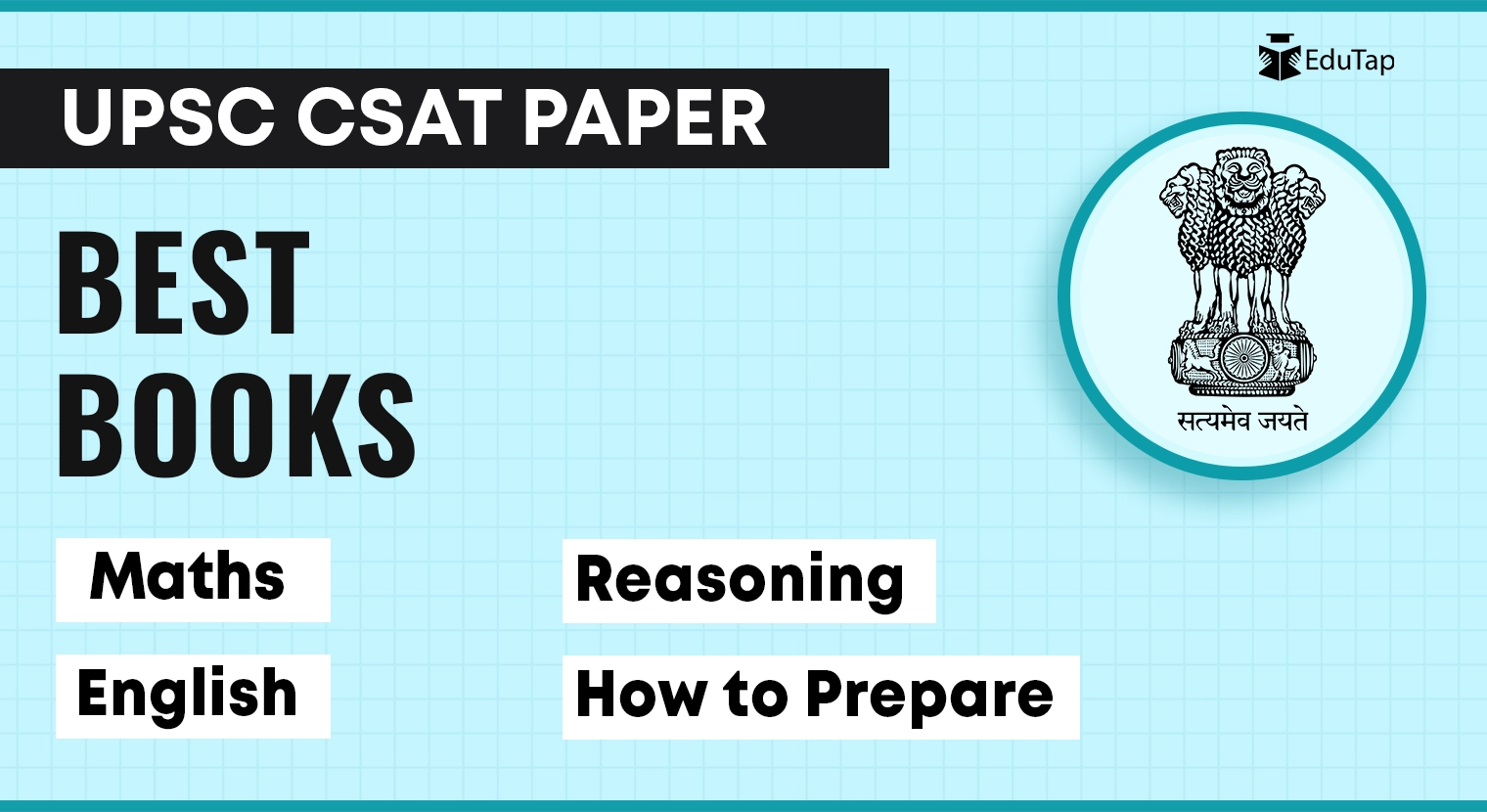The CSAT paper is an integral part of the UPSC Civil Services Preliminary Examination, and good preparation is vital for aspirants to qualify this paper. Although it is a qualifying paper, you need a precise and well-structured strategy to score at least 66 marks to qualify.
This article explains the best strategy for UPSC CSAT preparation and other essential information to help you easily score 70+ marks by putting in very limited time.
UPSC CSAT Pattern
Before jumping to the UPSC CSAT preparation, you must first understand the exam pattern, marking scheme, mode, and qualifying marks of the CSAT paper. It will help you develop a structured and effective study plan, build confidence, and perform at your best on the exam day.
| UPSC CSAT Pattern | |
| Total Number of Questions | 80 |
| Total Marks | 200 |
| Per Question Marks | 2.5 |
| Total Time | 2 Hours |
| Negative Marking | 1/3rd, i.e. 0.83 marks |
| Qualifying Marks | 33%, i.e. 66 marks |
| Sectional Timing | No |
| Mode of Exam | Offline (Pen and Paper) |
| Paper Type | Objective |
| Paper Language | English and Hindi |
How to Prepare for UPSC CSAT PAPER 2?
The CSAT paper is qualifying in nature, and you have to score a minimum of 33% marks, i.e. 66 marks out of 200 in this paper. Having said this, you need to understand that this paper is not a cakewalk anymore. From its introduction in 2011, the difficulty level of this paper has increased over the years.
Follow the below steps to prepare well for UPSC CSAT.
Step 1 Understand the UPSC CSAT Syllabus
The official notification of the UPSC Civil Services Examination specifies the syllabus of the CSAT paper is as follows:
- Comprehension
- Interpersonal skills including communication skills
- Logical reasoning and analytical ability
- Decision-making and problem-solving
- General mental ability
- Basic numeracy (numbers and their relations, orders of magnitude, etc. (Class X level)
- Data interpretation (charts, graphs, tables, data sufficiency, etc. (Class X level)
For easy understanding, the above syllabus can be divided into 3 subjects:
- Maths
- Reasoning
- English
| Subject | Syllabus as per UPSC notification |
| Maths | General mental ability Basic numeracy (numbers and their relations, orders of magnitude, etc. (Class X level) Data interpretation (charts, graphs, tables, data sufficiency, etc. (Class X level) |
| Reasoning | Logical reasoning and analytical ability |
| English | Comprehension |
Important Note:
We have deliberately not listed “Decision Making and Problem Solving” and Interpersonal skills, including communication skills, in the above table, as no question on these topics has been asked since 2014.
Step 2 See Where You Stand
The next step is to assess your current status in this paper. To find out where you currently stand, take at least two recent previous years’ papers and complete each within a two-hour period. Calculate your score for each paper.
- If you score above 80 marks in both papers within the two-hour limit, you are already proficient in this exam. In this case, spending excessive time on preparation may not be productive, as you must also prepare for general studies and optional subjects.
- However, if your score is below 70 marks, it’s crucial to understand that you’ll need to allocate dedicated time and effort to excel in this paper. Consequently, you should plan your preparation strategy accordingly.
Step 3 Identify Your Strong and Weak Areas
You might excel in maths but struggle with reasoning and English, or vice versa. After attempting at least 2 recent previous years’ papers, analyse your performance. Note which section was easy, which was moderate, and where you found the most difficulty.
Additionally, identify your strengths and weaknesses in each subject by topic. This analysis will help you create a personalised strategy for your UPSC CSAT preparation.
Step 4 Start Slow But Be Consistent
Don’t wait until the last 2-3 months before the prelims if you scored below 70 marks in the latest 2 previous years’ papers. Start your CSAT preparation now with just 1-1.5 hours daily.
Always remember that consistency plays a huge role in your selection as an officer via UPSC civil services, and the CSAT paper is no exception to this rule. As the prelims approach, you’ll need to revise general studies and current affairs on the one hand and attempt mocks on the other.
So, start early, spend a little time on CSAT regularly, and you’ll be well-prepared by the time the prelims approaches.
Step 5 Shortlist Your Study Material
With so much study material available, following everything for your UPSC CSAT preparation is unrealistic and ineffective. You need to shortlist the study materials for the CSAT paper 2.
Consider the following factors when making your selection:
- The material should match the current exam trends.
- Ensure the material is specifically for the UPSC CSAT, not other exams like IBPS PO, SBI PO, RBI Grade B, CAT, etc.
- Teachers must be experienced and highly knowledgeable in their subjects.
- Check if the students already using the material are satisfied with it.
- The teacher must be approachable to clear doubts; ensure you can communicate with your mentor.
Let us help you shortlist the best sources for UPSC CSAT paper preparation. Below, we have listed the recommended books, free YouTube videos, practice questions sources and paid online courses which will help you prepare strategically for the CSAT paper.
Best Books and Sources for UPSC CSAT Preparation
The UPSC CSAT paper consists of three subjects: Maths, Reasoning, and English. The section-wise UPSC CSAT booklist is given below:
- Best Maths Books for the UPSC CSAT Preparation
| Best Maths Books for the UPSC CSAT Preparation | ||||
| SNo. | Books | Author | Publisher | Buy Here |
| 1 | Quantitative Aptitude for Competitive Examinations | R.S. Agarwal | Oswal Publishers | Buy Online |
Other Recommended Sources
- Free Videos: YouTube Videos
- Practice Questions: Previous years’ questions
- Online Course: EduTap Comprehensive Course
- Best Reasoning Books for UPSC CSAT Preparation
| Best Reasoning Books for UPSC CSAT Preparation | ||||
| SNo. | Books | Author | Publisher | Buy Here |
| 1 | A Modern Approach to Verbal and Non-Verbal Reasoning | R.S. Agarwal | S Chand | Buy Online |
| 2 | A New Approach to REASONING Verbal, Non-Verbal & Analytical | B.S. Sijwalii & Indu Sijwali | Arihant Publications | Buy Online |
Other Recommended Sources
- Free Videos: YouTube Videos
- Practice Questions: Previous years’ questions
- Online Course: EduTap Comprehensive Course
- Best English Book for UPSC CSAT Preparation
| Best English Book for UPSC CSAT Preparation | ||||
| SNo. | Books | Author | Publisher | Buy Here |
| 1 | CSAT Paper II: Reading Comprehension | Ashok Kumar Singh & Nagendra Pratap | GKP | Buy Online |
Other Recommended Sources
- Other books: Word Power Made Easy by Norman Lewis for Vocabulary
- Free Videos: YouTube Videos
- Revision: Newspaper articles/Online articles (reading these will help you increase your reading speed and Vocabulary)
- Practice Questions: Previous years’ questions
- Online Course: EduTap Comprehensive Course
- Combined Maths, Reasoning, and English Books for UPSC CSAT Preparation
| Combined Maths, Reasoning, and English Books for UPSC CSAT Preparation | ||||
| SNo. | Books | Author | Publisher | Buy Here |
| 1 | Cracking the CSAT Paper-2 | Arihant Experts | Arihant Publications | Buy Online |
| 2 | Crack UPSC CSAT Civil Services Aptitude Test IAS Prelims Paper 2 | Disha Experts | Disha Publication | Buy Online |
These books include all the subjects: English, maths, and reasoning from the UPSC CSAT syllabus. These also contain previous years’ solved papers and mock tests for practice.
Step 6 Self Study or Coaching
The answer to this question varies from candidate to candidate, as every candidate has a different mindset with unique capabilities. You need to evaluate whether you can do self-study or need coaching.
To make this easy, ask yourself these questions.
- Can I analyse the previous years’ papers on my own?
- Can I grasp the concepts of maths, reasoning and English using books and free material?
- Can I ensure self-discipline?
If the answer to the above questions is a “yes”, you need not go for any coaching.
Use the freely available resources, and you will be good. If not, coaching will help you prepare for the UPSC CSAT exam.
Having said this, always remember that coaching serves 4 important purposes:
- The expert faculty does the hard part of analysing the previous years’ questions.
- You get everything you need to qualify for the exam in one place, and this saves you time.
- You get doubts support, so whenever you have any doubt related to any subject, you know there is a mentor you can contact.
- You get a community of like-minded people sailing in the same boat as yours, giving a feeling of belongingness.
By following the above-mentioned steps students can easily score 70+ marks and qualify the UPSC CSAT paper.
This is an overall strategy for your UPSC CSAT preparation. In the below sections, we have explained the subject-wise strategy for UPSC CSAT preparation.

Subject Wise Strategy for UPSC CSAT Preparation
1. How to Prepare for UPSC CSAT Maths?
Before finding out how to prepare for UPSC CSAT Maths, let’s analyse the most important topics for Maths.
Most Important Topics for CSAT Maths
We have analysed the year-wise trend of the number of questions asked from each topic of maths from 2014 to 2023 to identify the most important topics.
| Year-Wise Topic-Wise Distribution of Maths Questions | ||||||||||
| Topic | 2023 | 2022 | 2021 | 2020 | 2019 | 2018 | 2017 | 2016 | 2015 | 2014 |
| Percentage | 1 | 4 | 7 | 2 | 9 | 2 | 3 | 3 | 6 | 6 |
| Ratio and Proportion | 0 | 1 | 4 | 2 | 2 | 0 | 3 | 4 | 6 | 3 |
| Profit and Loss | 0 | 1 | 1 | 2 | 3 | 3 | 1 | 1 | 0 | 1 |
| Compound Interest | 1 | 0 | 0 | 0 | 0 | 0 | 0 | 0 | 0 | 1 |
| Data Interpretation | 0 | 0 | 0 | 1 | 0 | 14 | 0 | 0 | 3 | 5 |
| Ages & Partnership | 1 | 1 | 1 | 0 | 2 | 0 | 1 | 1 | 1 | 0 |
| Time & Work | 1 | 1 | 1 | 1 | 0 | 0 | 1 | 2 | 0 | 0 |
| Time, Speed, and Distance | 0 | 2 | 1 | 2 | 1 | 3 | 2 | 3 | 2 | 3 |
| Pipes & Cistern | 0 | 0 | 1 | 0 | 0 | 0 | 0 | 0 | 1 | 0 |
| Boats & Stream | 0 | 0 | 0 | 1 | 0 | 0 | 0 | 1 | 0 | 0 |
| Probability | 1 | 0 | 0 | 0 | 0 | 1 | 2 | 1 | 0 | 0 |
| P&C | 11 | 7 | 3 | 3 | 2 | 2 | 3 | 1 | 6 | 1 |
| Alligation Mixture | 0 | 1 | 1 | 3 | 0 | 0 | 0 | 0 | 0 | 0 |
| Number System | 22 | 15 | 13 | 18 | 8 | 5 | 6 | 5 | 1 | 1 |
| Average | 0 | 1 | 3 | 3 | 2 | 0 | 3 | 2 | 0 | 0 |
| Mensuration 2D, 3D | 2 | 1 | 0 | 3 | 0 | 2 | 1 | 3 | 0 | 0 |
| HCF & LCM | 1 | 1 | 0 | 3 | 0 | 0 | 0 | 3 | 0 | 2 |
| Number Series | 2 | 2 | 3 | 1 | 3 | 4 | 0 | 0 | 2 | 1 |
| Total | 43 | 38 | 36 | 45 | 32 | 35 | 25 | 30 | 28 | 24 |
Most Important Topics for CSAT Maths
The most important topics for CSAT maths that can be identified from the above table are as follows:
- Number System
- HCF and LCM
- Percentage
- Profit and Loss
- Ratio and Proportion
- Age and Partnership
- Time and Work
- Time, Speed and Distance
- Average
- Mensuration 2D and 3D
- Permutation and Combination
- Probability
- Number Series
Other Key Takeaways
From the above table, you can see that the weightage of maths questions has steadily increased over the years. From 24 out of 80 questions in 2014, the number of questions asked from maths in 2023 went up to 43. This means that more than 50% of the paper comprises maths questions, and an aspirant must prepare accordingly.
Strategy to Prepare for UPSC CSAT Maths
Follow the below-mentioned strategy to prepare for UPSC CSAT maths:
- Start with the Basics
Start with the basics of mathematics. Ensure you understand fundamental concepts to build a strong foundation for more complex topics.
- Learn Tricks and Shortcuts
Learn time-saving techniques, shortcuts, and tricks for solving mathematical problems. These can help you save time as there is limited time in the CSAT.
- Focus on Important Topics Only
The time is limited for UPSC CSAT aspirants, as they also need to prepare for general studies, optional, and current affairs. So, you can save time by focusing on the most important topics only.
- Solve Previous Years’ Question Papers
Solve the previous years’ UPSC CSAT Paper 2 maths sections to understand the exam pattern, type, and level of questions asked.
- Practice Regularly
Maths requires practice. Regularly practise from your study materials and focus on solving various problem types to develop a broad skill set.
- Attempt Mock Tests
Take multiple mock tests to simulate the actual exam environment. Time yourself while taking these tests to improve your time management skills.
- Review and Analyse
The prime purpose of practice is to review your answers and identify your mistakes. Understanding your errors will help you avoid them in the actual exam.
- Seek Guidance
Consider joining reputable coaching institutes or online courses for expert guidance.
By following the above-mentioned tips, you can have a strong hold on maths even if you are from a non-maths background.
2. How to Prepare for UPSC CSAT Reasoning?
Similar to maths, we need to understand the trends of previous years’ questions to identify the most important topics from reasoning.
Most Important Topics for CSAT Reasoning
We have analysed the year-wise trend of the number of questions asked from each topic of reasoning from 2014 to 2023 to identify the most important topics.
| Year-Wise Topic-Wise Distribution of Reasoning Questions | ||||||||||
| Topic | 2023 | 2022 | 2021 | 2020 | 2019 | 2018 | 2017 | 2016 | 2015 | 2014 |
| Alphanumeric Series | 2 | 2 | 1 | 0 | 1 | 0 | 0 | 0 | 0 | 0 |
| Coding & Decoding | 1 | 0 | 1 | 1 | 0 | 2 | 1 | 0 | 0 | 0 |
| Continues Letter Series | 1 | 0 | 1 | 1 | 1 | 0 | 0 | 0 | 0 | 0 |
| Analogy | 0 | 0 | 1 | 1 | 0 | 2 | 0 | 0 | 0 | 0 |
| Direction Sense | 0 | 1 | 2 | 1 | 2 | 0 | 0 | 3 | 1 | 2 |
| Blood Relation | 1 | 2 | 0 | 1 | 1 | 0 | 2 | 5 | 1 | 3 |
| Ranking & Order | 2 | 1 | 2 | 3 | 5 | 1 | 3 | 1 | 2 | 2 |
| Syllogism | 0 | 2 | 3 | 1 | 1 | 0 | 1 | 0 | 0 | 0 |
| Sitting Arrangement + Puzzle | 0 | 3 | 1 | 0 | 0 | 8 | 11 | 8 | 8 | 6 |
| Clock | 0 | 3 | 2 | 0 | 1 | 0 | 2 | 1 | 1 | 2 |
| Calendar | 1 | 1 | 3 | 1 | 3 | 0 | 0 | 0 | 0 | 0 |
| Dice | 0 | 0 | 0 | 0 | 0 | 3 | 0 | 0 | 1 | 0 |
| Counting Figure | 0 | 0 | 0 | 0 | 0 | 1 | 0 | 0 | 0 | 0 |
| Cube & Cuboid | 1 | 0 | 0 | 0 | 3 | 1 | 1 | 1 | 0 | 0 |
| Images | 0 | 0 | 0 | 0 | 0 | 2 | 0 | 0 | 2 | 5 |
| Analytical Reasoning | 2 | 0 | 0 | 0 | 0 | 0 | 4 | 3 | 8 | 4 |
| Total | 11 | 15 | 17 | 10 | 18 | 20 | 25 | 22 | 22 | 24 |
Most Important Topics for CSAT Reasoning
The most important topics for CSAT reasoning that can be identified from the above table are as follows:
- Syllogism
- Blood Relation
- Direction Sense
- Alphabetical and Alphanumeric Series
- Coding and Decoding
- Calendar
- Clock
- Continuous Letter Series
- Ranking and Order
Other Key Takeaways
From the above table, you can see that the weightage of reasoning questions has steadily decreased over the years. From 24 out of 80 questions in 2014, the number of questions asked from reasoning in 2023 went down to just 11.
Strategy to Prepare for UPSC CSAT Reasoning
Follow these below-mentioned strategies to prepare for UPSC CSAT reasoning:
- Learn the Basics
Start with the basics of reasoning. Understand concepts like alphabetical & alphanumeric series, coding-decoding, direction sense, syllogism, and blood relations. Ensure you have a strong foundation in these important topics.
- Practice Regularly
Reasoning is also a skill that improves with practice. Solve various questions regularly by covering various question types and difficulty levels.
- Focus on Important Topics
Again, you need to save time by focusing on the most important topics.
- Work on Time Management
Time management is crucial in the CSAT paper, so practise solving reasoning questions within a set time frame.
- Solve Previous Years’ Question Papers
Solving previous years’ question papers and taking mock tests are the most effective parts of a strategy for UPSC CSAT reasoning preparation.
- Time-Bound Things
Replicate the actual exam scenario, and attempt several tests by setting a timer to refine your pacing skills.
- Review and Analyse
The most important step is to review the answers of your mock tests and analyse your mistakes. Always learn from your mistakes to avoid them in the actual exam.
- Seek Guidance
Consider joining reputable coaching institutes or online courses for expert guidance.
3. How to Prepare for UPSC CSAT English?
Like the previous two subjects, let’s understand the trends of previous years’ questions to identify the best strategy for English.
Most Important Topics for CSAT English
We have analysed the year-wise trend of the number of questions asked from each level of passage of English Comprehension from 2014 to 2023 and the data is presented in the table below.
Kindly note that level 1 passages are the ones which consist of only 1 question. Level 2, Level 3, and Level 4 passages consist of 2,3 and 4 questions, respectively.
| Year-Wise Topic-Wise Distribution of English Questions | ||||||||||
| Passage level | 2023 | 2022 | 2021 | 2020 | 2019 | 2018 | 2017 | 2016 | 2015 | 2014 |
| Level 1 Passage | 22 | 6 | 25 | 15 | 18 | 14 | 28 | 14 | 19 | 0 |
| Level 2 Passage | 4 | 12 | 2 | 10 | 12 | 4 | 2 | 2 | 4 | 6 |
| Level 3 Passage | 0 | 9 | 0 | 0 | 0 | 3 | 0 | 0 | 3 | 6 |
| Level 4 Passage | 0 | 0 | 0 | 0 | 0 | 4 | 0 | 3 | 4 | 20 |
| Total | 26 | 27 | 27 | 25 | 30 | 25 | 30 | 28 | 30 | 32 |
Most Important Topics for CSAT English
The most important topics for CSAT English that can be identified from the above table are as follows:
- Reading Comprehension
- Assumption
- Inference
- Conclusion
Other Key Takeaways
The weightage of English comprehension questions has varied from 25 to 32. An aspirant can attempt about 60-70% of these questions with 100% accuracy.
Strategy to Prepare for UPSC CSAT English
Follow these below-mentioned strategy to prepare for UPSC CSAT English:
- Improve Your Vocabulary
Improve your vocabulary and grammar using books such as Word Power Made Easy by Norman Lewis.
- Read Hindu Editorials
Practice reading Hindu Editorials regularly to enhance reading and comprehension skills.
- Solve Previous Years’ Questions
Finish the previous years’ questions first to get the context of the level of passages asked in the exam.
- Practice Regularly
Remember, mastering English takes practice, and reading helps overcome fear. Moreover, try to engage in conversations in English to improve your listening and speaking abilities.
- Seek Guidance
Consider joining reputable coaching institutes or online courses for expert guidance.
By following the above-mentioned tips, you can have a strong hold on English, even if you are from a non-English background.
Time Table For UPSC CSAT Preparation
Here’s a subject-wise sample timetable that you can customise according to your strengths, weaknesses, and the available time you have:
1. Maths
| Maths | |
| Topic | No. of Hours (Total 124 hrs) |
| Number System | 15 |
| HCF and LCM | 3 |
| Percentage | 6 |
| Profit and Loss | 5 |
| Simple Interest | 4 |
| Compound Interest | 4 |
| Ratio and Proportion | 4 |
| Ages and Partnership | 4 |
| Data Interpretation | 5 |
| Time and Work | 6 |
| Pipes and Cistern | 4 |
| Time, Speed and Distance | 6 |
| Boats and Stream | 4 |
| Average | 6 |
| Alligation and Mixture | 4 |
| Mensuration 2D | 12 |
| Mensuration 3D | 12 |
| Permutation and Combination | 10 |
| Probability | 10 |
Important Notes:
- You can read these topics from the maths books we have mentioned above in the article.
- You can divide the number of hours for each subject according to your timetable. For example, someone may devote 1 hour per day per subject while some others may prefer to devote 2 hours per day per subject.
- Please keep in mind that you also need to dedicate time to cover other subjects.
- Moreover, you can increase or decrease the number of hours on a particular topic according to your strengths and weaknesses.
2. Reasoning
| Reasoning | |
| Topic | No. of Hours (Total 62 hrs) |
| Alphabetical and Alphanumeric Series | 4 |
| Coding and Decoding | 6 |
| Syllogism | 6 |
| Direction Sense | 4 |
| Ranking and Order | 6 |
| Blood Relation | 4 |
| Letter Series | 2 |
| Analogy | 2 |
| Clock | 6 |
| Calendar | 6 |
| Dice | 4 |
| Venn Diagram | 4 |
| Counting Figure | 4 |
| Cube and Cuboid | 4 |
Important Notes:
- You can read these topics from the reasoning books we have mentioned above in the article.
- You can divide the number of hours for each subject according to your timetable. For example, someone may devote 1 hour per day per subject while some others may prefer to devote 2 hours per day per subject.
- Please keep in mind that you also need to dedicate time to cover other subjects.
- Moreover, you can increase or decrease the number of hours on a particular topic according to your strengths and weaknesses.
3. English
Practise at least 1 reading comprehension daily and analyse your performance. To get a better hold on comprehension, start reading articles on the following topics:
- Economic Issues
- Social Issues
- Science & Technology
- Rural Issues
- Healthcare
- Climate & Environment
- Current Burning Issues (Not Political)
General Tips:
- Adjust the above timetable to suit your specific needs.
- Take short breaks (5-10 minutes) between sessions.
- Practise topic-wise questions after the completion of each topic from maths and reasoning.
- Start attempting maths and reasoning practice papers every 10 days after completing at least 50% of your syllabus.
- Review your performance, identify your weak areas, and dedicate more time to them.

Conclusion
Preparing for UPSC CSAT 2024 requires dedication, a well-planned strategy, and focused effort. The initial exam preparation steps include:
- Understanding the pattern and syllabus.
- Collecting quality study materials.
- Creating a well-structured study plan for each subject.
Remember that CSAT paper’s difficulty varies from candidate to candidate, but a strategic approach, positive mindset, and consistent practice help overcome challenges.
FAQs
The difficulty of CSAT is relative and depends on individual factors. It is essential to identify your strengths and weaknesses, create a well-structured study plan, and practice regularly to maximise your chances of qualifying for the CSAT.
Additionally, seeking guidance from experienced mentors can help you navigate the challenges effectively.
The first step in preparing for UPSC CSAT (Civil Services Aptitude Test) is to:
a. Familiarise yourself with the CSAT exam format
b. Carefully go through the CSAT syllabus
c. Pay attention to the exam pattern
Create a study schedule that allocates sufficient time to each subject. Consistency is key, and practising time management through mock tests is crucial.
Prioritise your daily tasks, set achievable goals, and allocate time for breaks and relaxation. A balanced routine ensures better concentration and reduces burnout.




